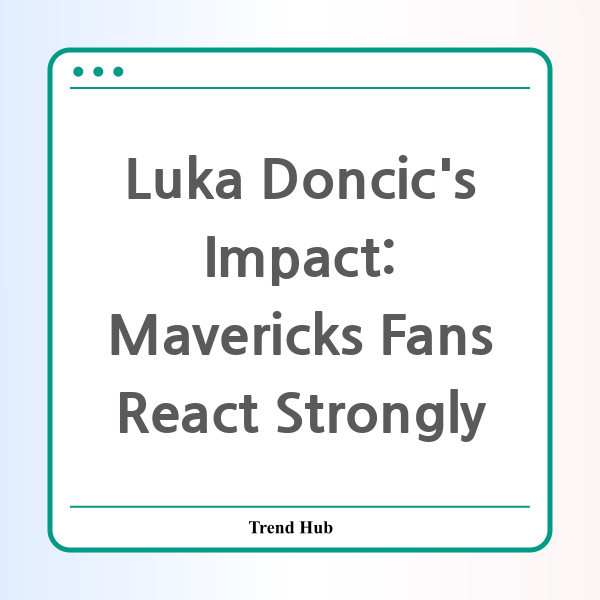* This website participates in the Amazon Affiliate Program and earns from qualifying purchases.

The Dallas Mavericks have recently been at the center of a heated debate following the trade of their superstar, Luka Doncic. General manager Nico Harrison found himself in the spotlight, admitting that he significantly underestimated the passion Mavericks fans have for Doncic. With the reality of the trade still echoing in the hearts of many fans, it raises the question: What does Luka Doncic mean to the Dallas Mavericks and their dedicated fanbase?
During a news conference, Harrison expressed surprise at the magnitude of the fan backlash after the decision to trade Doncic. "I knew Luka was important to the fan base," he stated. "I didn’t quite know it to what level." This revelation shows that even the front office can misread the relationship between a player and the fans, especially when that player has the potential to become a franchise icon.
Dallas Mavericks fans have always embraced Doncic with open arms, evident during games when the arena reverberates with chants of his name. Such passion can be seen with crowds filled with thousands of fans, proving the emotional tie between Doncic and the Mavericks community. Yet, Harrison believed that the changes made to the team’s roster—which included acquiring other players for a stronger defensive lineup—would eventually justify their decision.
Unfortunately, injuries plagued the Mavericks, preventing the newly assembled roster from showcasing its full potential on the court. The anticipated star lineup of Doncic, Kyrie Irving, and Anthony Davis never saw significant playtime together due to various injuries, hindering the team's chemistry and performance. This led to frustration among fans who believed that trading Doncic was a step in the wrong direction.
Harrison maintained that "defense wins championships" and defended the trade by suggesting that the team he envisioned could lead to a successful playoff run. He stated, "If you're putting a team on the floor that includes Kyrie, Klay Thompson, P.J. Washington, Anthony Davis, and Dereck Lively, we feel that's a championship-caliber team." He believed that winning would help silence any dissent among the fans. However, without the ability to see that vision play out on the court, many remain skeptical.
In the aftermath of this trade, Harrison acknowledged that he and the Mavericks fell short in their communication with the media and fans. The frustration surrounding the trade was evident, and Harrison admitted that more should have been done to clarify the reasoning behind it. He noted that the Mavericks' leadership had not properly communicated the rationale and intentions, particularly regarding the future goals of the franchise.
As the Mavericks look forward to the next season, Harrison remains optimistic that the team can rebound. He stated that health is key, emphasizing the need for the roster to recover and gel before achieving their championship aspirations. He is hopeful that with a fully healthy team, including Irving, the Mavericks can find success and gradually mend their relationship with the fan base.
Ultimately, the future of the Mavericks hinges on their ability to overcome the current challenges, both on the court and in the hearts of their fans. As Harrison tries to move forward, he will need to confront the reality that Luka Doncic's trade will remain a topic of discussion, especially if the team struggles to perform. The journey for redemption begins now, with hope that winning games will restore the trust and enthusiasm of the Dallas Mavericks fans.
As we follow the evolving saga of the Mavericks and Doncic's legacy, one thing is clear: the bond between a city and its superstar is a powerful force, and the outcomes of decisions made now will echo for years to come.
* This website participates in the Amazon Affiliate Program and earns from qualifying purchases.